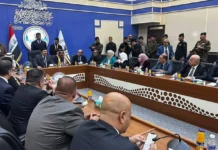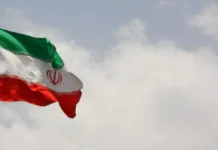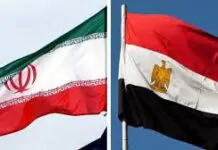Tishwash: Among them are Russia and China… Members of the Security Council support ending the mission of the UNAMI mission in Iraq
Yesterday, Thursday, a number of members of the UN Security Council, including Russia and China, supported Baghdad’s request to end the mission of the United Nations mission in Iraq by next year, but Washington did not immediately provide its support for this step.
Last week, the Iraqi government asked the United Nations to end, by the end of 2025, its political mission that it has been performing in the country for more than 20 years, considering that it is no longer necessary.
Iraq’s Deputy Representative to the United Nations, Abbas Kadhim Obaid Al-Fatlawi, repeated the request before the Council, yesterday, Thursday, saying, “The mission achieved its goals.”
Russian envoy Vasily Nebenzia supported this view, saying: “Iraqis are ready to take responsibility for the political future of their country.”
He added: “The remaining problems must not become an excuse for the United Nations mission to remain in the country indefinitely.”
China’s Deputy Representative to the United Nations, Geng Shuang, noted that within the framework of the annual renewal of the mission, whose mandate expires at the end of May, the Council must “propose a plan in order to ensure gradual withdrawal and a smooth transition towards final withdrawal.”
Given that UN missions can only operate with the consent of the host country, Britain and France have also expressed their support for the shift in the partnership between Iraq and the UN.
The position of the United States was more ambiguous, as Ambassador Linda Thomas-Greenfield said that the United Nations Mission (UNAMI) still had “important work to perform,” and did not address Baghdad’s request.
She emphasized the mission’s key role in many important political issues, such as supporting the organization of elections and promoting human rights, although Iraq clearly requested that the mission focus more directly on economic issues.
In an assessment requested by the council, German diplomat Volker Perthes said in March that UNAMI, which had more than 700 staff as of late 2023, “appears in its current form to be too large.”
Perthes called on the mission to “begin transferring its tasks to the national institutions and the United Nations team in the country in a responsible, organized and gradual manner within an agreed upon time frame.” link
************
CandyKisses: Gold prices are heading for gains for the second week in a row
Economy News – Baghdad
Gold prices looked poised for a second straight weekly gain on Friday, following recent U.S. gains.
Inflation data reinforced expectations that the Federal Reserve may cut interest rates this year.
By 0236 GMT, spot gold was up 0.1 percent at $2,379.14 an ounce.
Bullion prices are up 0.7% so far this week.
Gold futures settled at $2,383.20.
The dollar index fell (. DXY), down 0.6% for the week so far, against its rivals, making gold less expensive for holders of other currencies.
Data this week showed signs of slowing inflation in the United States. The Federal Reserve is good news, but policymakers have yet to publicly change their views on the timing of the interest rate cuts that investors believe will begin this year.
Bullion is known as an inflation hedge, but higher interest rates increase the opportunity cost of holding non-yielding gold.
Spot silver fell 0.2 percent to $29.53 an ounce after hitting a three-year high in the previous session, and palladium fell 1.1 percent to $982.77.
Platinum rose 0.3% to $1,060.15, after hitting its highest level since May 12, 2023 in the previous session. The metal has gained about 7% since the beginning of the week.
***********
CandyKisses: Monetary Fund’: ‘Internal stability has improved since the new government took office in October 2022’
Economy News- Washington, D.C. – On May 13, 2024, the Executive Board of the International Monetary Fund (IMF) concluded Article IV consultations with Iraq and examined and approved staff assessment.
Internal stability has improved since the new government took office in October 2022, facilitating the adoption of Iraq’s first three-year budget, which necessitated a major financial expansion starting in 2023, supporting that strong recovery in Iraq’s non-oil economy after a contraction in 2023. 2022.
Iraq has largely not been affected by the conflict in the region, and domestic inflation fell to 4% by the end of 2023, reflecting lower international food prices, the currency’s revaluation as of February 2023, and the return of trade finance to normal.
Continued financial expansion is expected to boost growth in 2024.
*Evaluation of the Executive Board*:
Executives approved the content of the staff assessment, welcoming the strong economic recovery, low inflation, and improved local conditions that led to the implementation of the first-ever three-year budget.
The managers agreed that the immediate implementation of customs and revenue management reforms, the full implementation of the unified Treasury account, strict control and the limitation of the use of extrabudgetary funds and government guarantees, are essential to support fiscal consolidation.
Managers praised the central bank’s efforts to tighten monetary policy and strengthen the liquidity management framework.
Better coordination between financial and monetary operations would help absorb excess liquidity and promote the transition of monetary policy.
Directors agreed that accelerating the restructuring of large state-owned banks is essential. They were supported by the modernization of the private banking sector, by facilitating the establishment of correspondent banking relationships, reducing regulatory uncertainties, and enhancing the efficiency and competitiveness of private banks.
The directors agreed that improving governance and anti-corruption are also essential, and encouraged further strengthening the anti-money laundering and terrorist financing framework, strengthening public procurement and business systems, and addressing shortcomings in the electricity sector.
Directors welcomed renewed efforts towards WTO accession and encouraged authorities to improve coverage and timing of statistics.
Directors welcomed the authorities’ request to create a policy coordination tool.
The next Article IV consultations with Iraq are expected to take place in the standard 12-month session.






